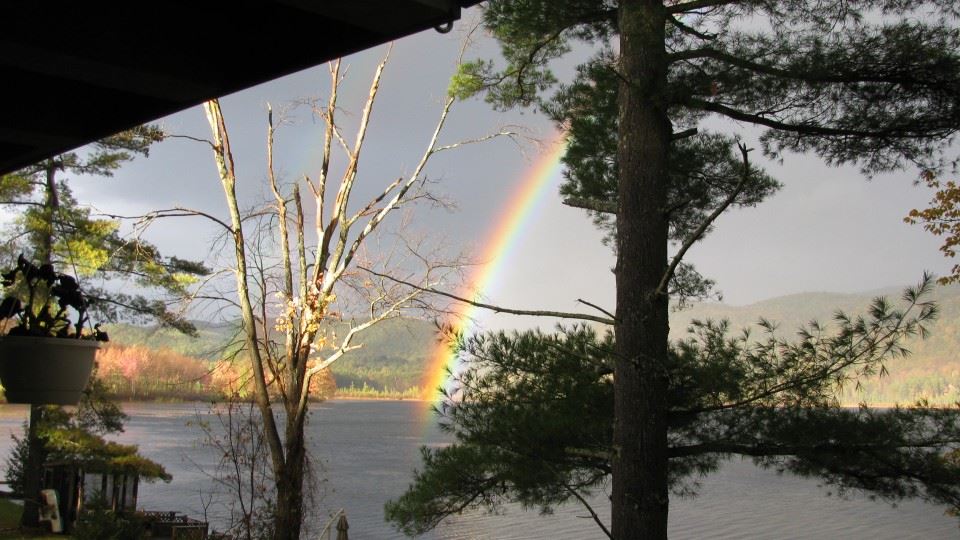Hello LSC.
Over the past year, you may have read numerous articles and opinion pieces in the Rutland Herald, read an online posting, or attended a meeting concerning conditions in the Little Lake. Unfortunately, many contained misleading information while failing to convey important facts. We feel it is necessary to respond. We also want to provide details of a multi-year plan to help improve conditions in Little Lake.
First, a little history.
What are the Lake St. Catherine Association (LSCA) and the Lake Saint Catherine Conservation Fund (LSCCF)?
We are the Lake St. Catherine Association (LSCA), a Vermont not-for-profit 501(c)(3) corporation, organized on August 31, 1953. For 66 years, we’ve been stewards of the lake by fulfilling our mission of the preservation, protection and maintenance of Lake St. Catherine. In the late 1970’s, we began lake-wide management efforts by directing and funding important programs that include (but are not limited to): milfoil control, invasive species control (boat launch Greeter program), water testing, pollution and phosphorous mitigation and water safety. We also fund one-time projects such as the clearing of the Lily Pond channel to restore connectivity from Lily Pond to the North Bay.
In 2009, the Lake Saint Catherine Conservation Fund (LSCCF) was formed by Little Lake property owners with a focus on Little Lake’s unique issues. They applied for and received a permit for an aeration experiment by installing a submersed diffused air aeration system which pumps oxygen into the lake. This system was presented as a way to help dissolve lake bottom muck (increasing water depth) and decrease Eurasian Watermilfoil (EMW, milfoil). The experiment began on July 30th, 2012. Earlier that year, on June 13th, 2012, the LSCA performed its last permitted milfoil control activities in the Little Lake so the experiment could be conducted.
Through the years since our last treatment in the Little Lake, the LSCA has been asked, “What do you do for the Little Lake?”. Our answer has been everything you have just read above. Everything we do is for the whole of Lake St. Catherine. We were asked to no longer perform lake management efforts in Little Lake by the LSCCF so they could conduct their aeration experiment. Because we have not been involved in the management of Little Lake since 2012, this has given some the impression that the LSCA is only concerned with the Big Lake. This is certainly not the case. All of our efforts are intended for the benefit of the entire lake.
With all this in mind, let’s address what’s been happening in Little Lake since 2012.
Introduction
What we present to you below will be based on studies, facts and years of data collection. We will not be pontificating our opinions or beliefs, only presenting conclusions based on the facts. Therefore, this information is being presented in a “just the facts” manner, and we ask that it be read with that tone in mind. We’re doing this to combat confusion and misinformation - and to make sure LSC property owners and local government officials are informed. Our goal is to make sure everyone who cares about the Little Lake and Lake St. Catherine as a whole will have all available information so we can work together on real solutions.
The LSCCF ran their aeration experiment in Little Lake from 2012 - 2018. In 2017, they also began a mechanical harvesting program that would cut and remove weeds using a mechanical harvesting machine (Note: The LSCA discontinued mechanical harvesting in 2004 because it was ineffective and caused milfoil to spread). During this time, the LSCCF has presented their own data to claim that the depth of Little Lake has increased and they maintained that the aeration was controlling milfoil. The LSCCF did not apply to renew their aeration permit for 2019, so the system was not in operation in 2019. The LSCCF also experimented with the use of weevils to control milfoil, which was unsuccessful.
Let’s look at a paper prepared by the Vermont DEC and the results of 17 years of Aquatic Vegetation Management Program reports which dispute the LSCCF’s claims.
The Vermont Department of Environmental Conservation issues aeration report
In January 2019, the Vermont DEC released a report entitled, “AERATION AS A LAKE MANAGEMENT TOOL AND ITS USE IN VERMONT”. The information specifically about Little Lake begins on page 15. While we encourage you to read the full report, we’ll quote some of the important information here.
First, let’s start with the DEC’s description of aeration in the introduction of the paper (all bold emphasis is ours):
“In recent years, aeration has been marketed to lake managers as a tool that could potentially manage aquatic plants and accumulated organic material on a lake bottom, also referred to as “muck.” The proposed mechanism for muck control through aeration is to increase oxygen at the lakebed to encourage decomposition of organic sediments. Although there is a market for installing aeration systems for these uses and some experimental installations are in place in Vermont, the scientific literature does not support or recommend the use of aeration as a tool for managing muck or aquatic plants (Osgood 2015, Wagner 2015).”
From the DEC report, specifically about Little Lake (all bold emphasis is ours):
“To address their concerns about increasing organic sediment accumulation, the Lake St. Catherine Conservation Fund (LSCCF) proposed to install a diffused air circulation (DAC) system throughout the lake. In 2011, a DAC system for the east side of the lake was authorized under a Lake Encroachment permit and later expanded and reauthorized in 2013. In 2015, the project was authorized to expand to the west side of the lake under another Lake Encroachment permit. The units in Little Lake were installed for the purpose of reducing organic sediment accumulation on the lakebed and approved under Lake Encroachment permitting as an environmental research project, which is a consideration of the public trust. This installation was viewed as a research project because there is a lack of evidence in the scientific literature that supports the use of aeration as a tool to reduce organic sediment accumulation.”
“Depth data was collected by LSCCF and the DEC; depth data varied greatly between the two groups. LSCCF provided depth data for 2012-2017 measured adjacent to diffusers as well as at four nearby water quality sites and two control sites. The LSCCF measured depth by pressing a pole attached to a square board down into the flocculant sediment (all data are calibrated to dam benchmark water level).”
“In 2017, the VT DEC recommended that LSCCF add sampling sites along transects between three diffusers and extending toward mid-lake to monitor the extent of the diffuser’s potential impact on lake depths. Depth data collected by LSCCF between June and October show increases in depth at each transect site varying from 0.5 to 0.7 feet, but overall depths were shallower (from 1.0 to 2.4 feet) moving away from the diffusers and did not increase from summer to fall. These depth measurements were taken by the LSCCF using the pole and board method. During a sampling visit in summer 2017, DEC recommended LSCCF adopt the use of a sludge sampler (“Sludge Judge”) they were testing to compare depth measurements between this measurement tool and the board and pole method. The sludge sampler may more accurately show the depth of settled solids. However, LSCCF provided no 2017 data using this method.”
“From the depth surveys conducted pre and post aeration installation by the VT DEC and others, there is no evidence to support that the use of the DAC system has altered the depth of Little Lake St. Catherine. Depths throughout Little Lake St. Catherine have remained relatively constant throughout the time depth sampling has occurred.”
“The LSCCF data shows significant depth increases in close proximity to the aeration diffusers. However, these depth changes were not observed from the bathymetric surveys conducted by the VT DEC. The fluid dynamics of organic sediments are poorly understood and small localized changes in depth are difficult to interpret. It is possible that the diffusers transport organic sediment away from their area of influence. Measuring depth using the sludge sampler will increase consistency and accuracy of data collection. The VT DEC recommends that the LSCCF use a standardized monitoring protocol for water quality data and for depth measuring so that the data may be better used for data assessment. Additionally, continuing to measure depths along a transect away from the diffuser will better characterize the effects of aeration.”
Also in the paper, the DEC included a results of a study involving Lake Apopka, a shallow (mean depth of about 5.2 feet), eutrophic lake in Florida (similar to Little Lake) that also ran an aeration experiment (all bold emphasis is ours):
“...96 aerators were installed in a 250-acre area of the lake for the purpose of decreasing organic sediment accumulation. Two applications of 1,000 pounds of microbes and 400 gallons of enzymes were added for bioaugmentation to speed up the decomposition process. It was anticipated that the installation of an aeration system would lead to increased water clarity, increased dissolved oxygen concentration, reduction of cyanobacteria, reduction of the decomposed organic muck layer on the lake bed, and a reduction of nutrient concentrations in the water column and the sediments. In an independent review of the experimental installation, University of Florida researchers saw no detectable differences in water chemistry between treatment areas and control samples.”
Then concluding:
“In 2017, the Harris Chain of Lakes Restoration Council, the governing body overseeing the restoration of Lake Apopka and other geographically related lakes, made an official recommendation in their 2017 Annual Report to the Florida Legislature to no longer support aeration projects as part of the overall restoration efforts. The Council determined that aeration to control sediment accumulation did not work to expectations, and that the aerators were likely transporting flocculant sediments around the lakebed, rather than oxidizing the sediments.”
Again, we encourage you to fully read the report.
17 years of lake-wide aquatic vegetation surveys
Each season, the LSCA contracts with SOLitude Lake Management to perform spring and fall aquatic vegetation surveys. Beginning in 2001, 199 total data points were mapped out using GPS on Lily Pond, Big Lake and Little Lake. These points are returned to each season to survey for aquatic plants and the reports are generated. All the reports dating back to 2001 can be viewed on our website in the Downloads section.
Let’s look at the data from the Little Lake from the past 10 years. In the following list of data points and charts, milfoil frequency of occurrence refers to the distribution of milfoil at the Little Lake data points, milfoil cover percent refers to the abundance of milfoil in Little Lake, total plant cover percent refers to the abundance of all weeds in Little Lake, and the plant biomass index is defined as:
0: No biomass; plants generally absent
1: Low biomass; plants growing only as a low layer on the sediment
2: Moderate biomass; plants protruding well into the water column but generally not reaching the water surface
3: High biomass; plants filling enough of the water column and/or covering enough of the water surface to be considered a possible recreational nuisance or habitat impairment
4: Extremely high biomass; water column filled and/or surface completely covered, obvious nuisance conditions and habitat impairment severe
The data for the Little Lake:

The charts for the Little Lake:
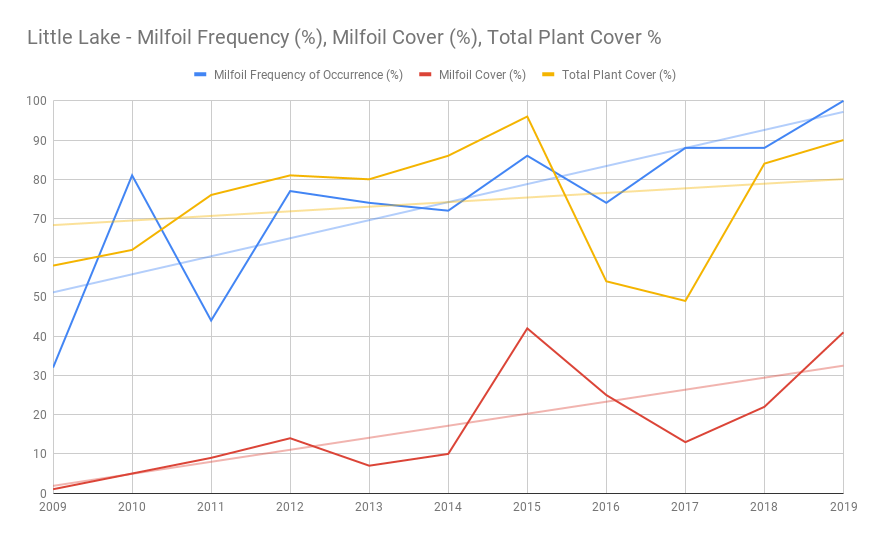
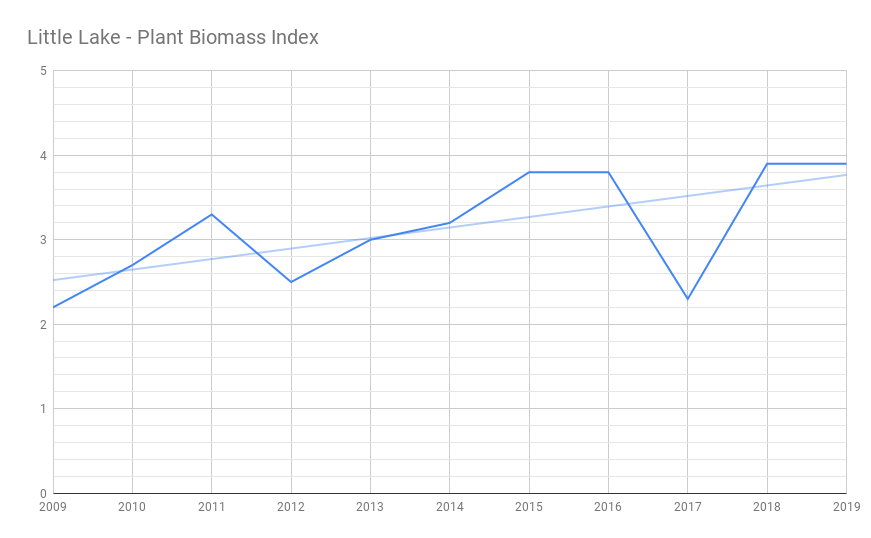
As you can see in the data, and plotted in the charts, all four data points are trending up (see the lightly shaded trendlines plotting through each color on the chart). This data shows that while the LSCCF was conducting their aeration experiment and mechanically harvesting and removing weeds in Little Lake, milfoil frequency of occurrence, milfoil cover percent, total plant cover percent and the plant biomass index are all trending up.
One note: you may have noticed the dip in 2016 and think that this may indicate that the aeration had some impact on weeds that year. But, as you’ll see in the data and chart below, there was a similar dip in the Big Lake that year. So, whatever conditions caused the weed decline, it was lake-wide.
The data for the Big Lake:

The chart for the Big Lake:
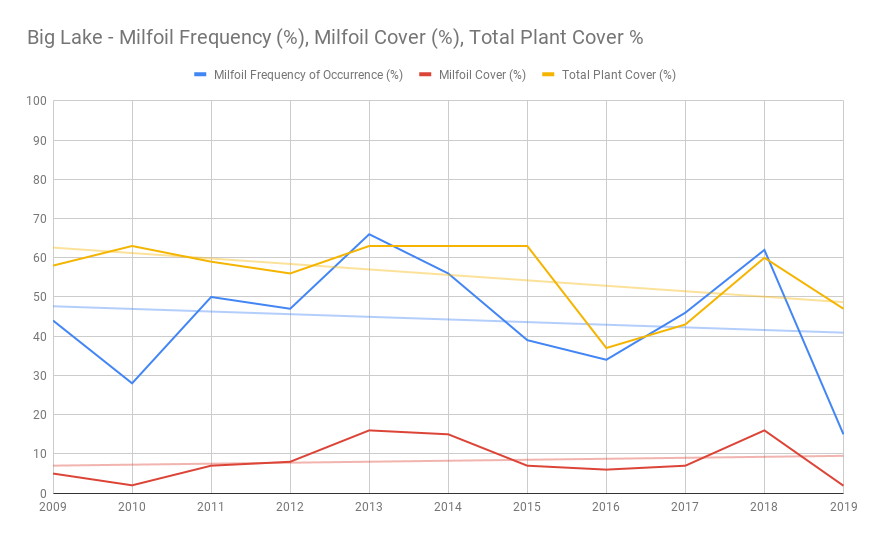
Summary and notes
To summarize, the conclusions reached by the DEC’s aeration paper and the historical plant data for Little Lake do not support the LSCCF’s claims of muck or weed reduction in Little Lake. Unfortunately, the aeration experiment did not work.
However, in October 2019, the LSCCF applied for a permit to expand on their existing aeration installation, which they expect will cost $400,000 over a 3 year plan.
One final note before moving on. Based on the data above, and the images shown below, you can see that the weed conditions of the Little Lake in 2019 without the aeration system running are comparable to the conditions in 2018 when it had been running. We mention this to dispute the commentary in this LSCCF video posted on July 24, 2019 (Video Link). As heard during the video commentary, the video was taken on July 4th, 2019.
Commentary from the video:
"July 4th, 2019. After 6 seasons of aeration, no aeration on in 2019, and this is what the lake looks like. I haven't seen this many plants at the surface of LL since 2010, 2011, before aeration."
Clearly the intent was to create a narrative that the Little Lake was in its current state (in the video taken on July 4th, 2019) due to lack of aeration in the 2019 season. At most, the aerators could have only been on for approximately 3 months that season, as ice-out was mid-April.
It is important to note that the video does not show the condition of Little Lake to be any different from the fall of 2018.
The following photos were taken in June of 2018, near aerators that have been running the longest on Little Lake, on the east side.
The thick beds of healthy milfoil surround the aeration area and are growing to the surface. It can also be observed that the water displacement from the aerators are arcing the milfoil away from the aerator, allowing the plants to grow longer than just stopping at the surface.
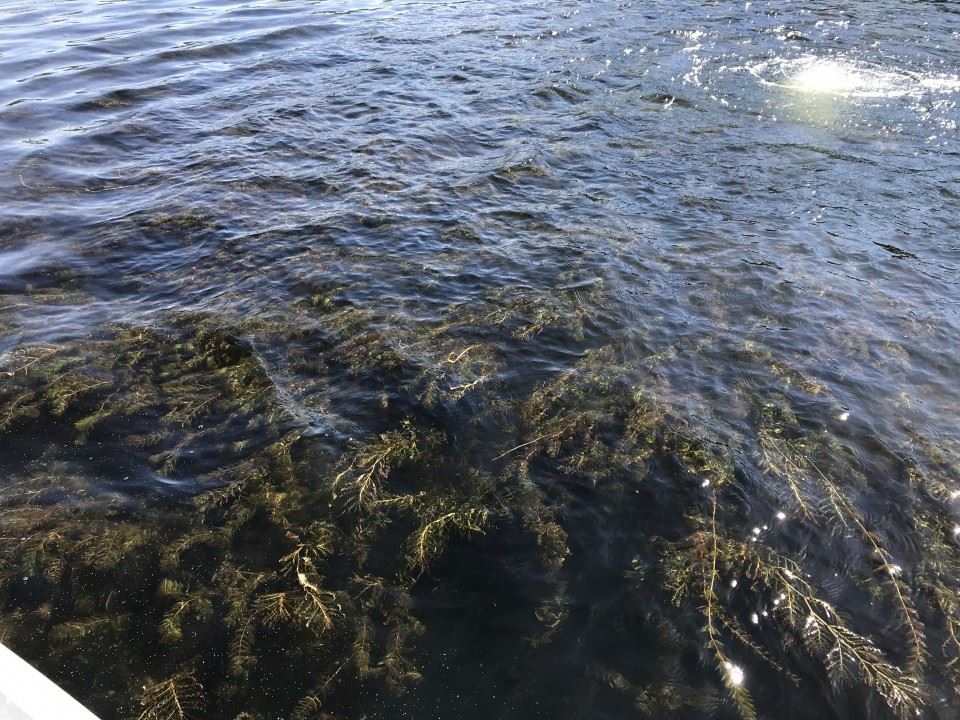

From the video:
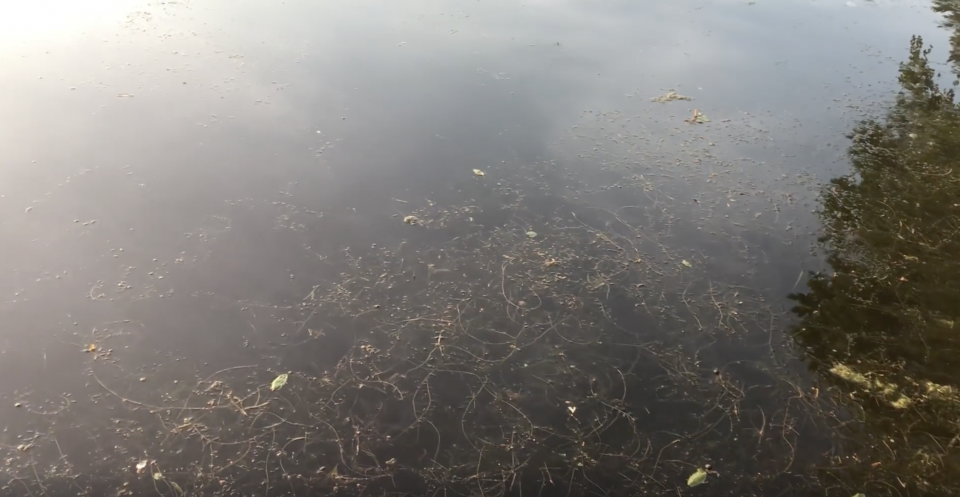
Proven results
Each season, the LSCA performs a milfoil control program to keep milfoil in the lake at manageable levels using, most recently, a combination of spot ProcellaCOR EC treatments, diver assisted suction harvesting (DASH) and hand-pulling. Using this proven, balanced approach, the LSCA has been able to keep milfoil under control in treated areas since 2004.
This season we were approved to use a new product called ProcellaCOR EC. As compared to the previous product used over the past few years (Renovate), ProcellaCOR EC allows us to use 200x - 400x less product, has significantly less water use restrictions, and it is highly targeted to milfoil - promising longer lasting results. For example, the recommended ProcellaCOR EC water use restrictions for the 2019 season were only the day of treatment for recreational use (vs. 2 days for Renovate) and 7 days for using lake water for irrigation (vs.120 days for Renovate).
Based on our ProcellaCOR EC and DASH results in 2019, and in consultation with the DEC and our lake management contractor SOLitude Lake Management, we have a real opportunity to knock back milfoil to levels not seen in the lake in many years.
Below is a chart showing the milfoil distribution in our treatment areas from the fall 2018 survey to the fall 2019 survey:
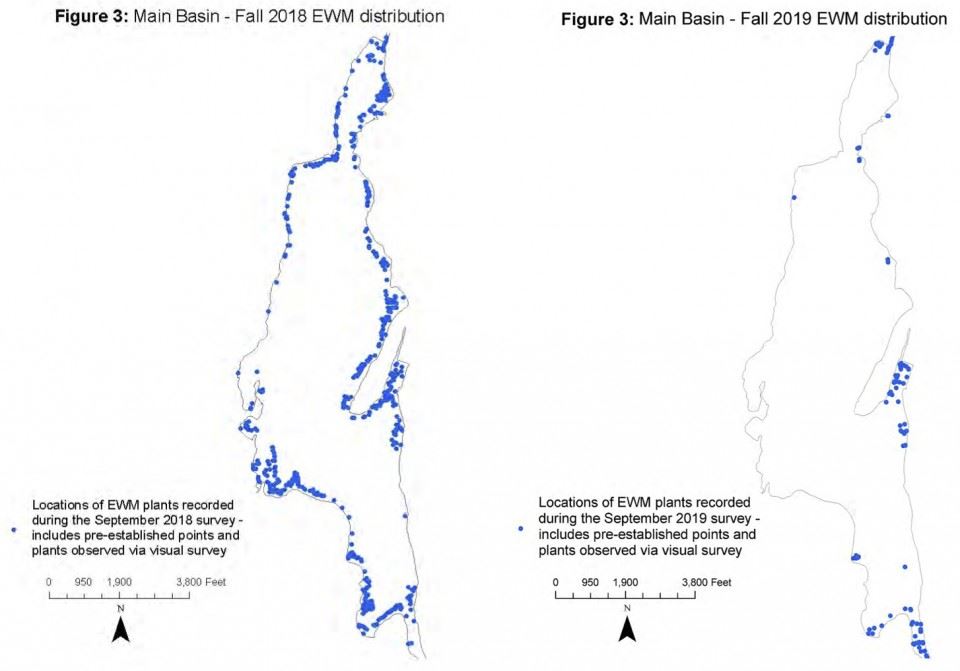
This is the result after one season of adding ProcellaCOR EC (treating only a small number of sites) to our milfoil control control program, again, in combination with our substantial DASH efforts.
The plan
Based on our 2019 results using a balanced combination of ProcellaCOR EC and DASH, we see an opportunity to significantly reduce the amount of milfoil in LSC to a level which would allow us to primarily focus on DASH and hand-pulling for our milfoil control efforts (our ProcellaCOR EC treatment involved only 5% of the Big Lake with excellent results). The LSCA is currently creating a multi-year plan to achieve this goal. But, for this to be possible, we need to address the biggest source of milfoil in LSC, the Little Lake. If left unchecked, the milfoil in Little Lake will continue to spread up the Channel and into the Big Lake, which will make it very difficult for the LSCA to achieve its objectives of both milfoil control and spread prevention. Treating selected portions of the Little Lake with ProcellaCOR EC as needed to gain control over the Little Lake’s milfoil over a several year period will be part of this multi-year plan.
What could this plan achieve?
Our plan sets a goal to reduce the amount of milfoil lake-wide to the point that we can primarily focus our control methods on DASH and hand-pulling. A volunteer milfoil spotting team would be formed to search for any milfoil plants at the beginning of each season, so the DASH crew can be used to remove them over the course of the summer. Property owners around the lake would work together to remove any floating milfoil they see on the lake or on their shoreline. Funds that are budgeted yearly for milfoil control can be reduced and redirected to other vitally important programs like aquatic invasive species prevention (Greeter Programs at boat launches), and pollution and phosphorus prevention through stormwater runoff mitigation projects (Lake Wise).
Then, specifically in Little Lake, the LSCA would fully support the DEC’s recommendations (from their aeration report):
“...continuing to work with local partners to implement watershed practices that address sedimentation may provide the clearest and most predictable path forward for addressing sedimentation concerns in Little Lake. Shoreline development, runoff from roads, and increased development pressure elsewhere in the watershed all contribute to sedimentation in Little Lake.
Aquatic invasive species and dense aquatic plant growth is an important issue affecting Little Lake and methods other than aeration may be more effective at addressing this issue.”
We also fully support the current efforts of the Poultney Mettowee Natural Resources Conservation District (PMNRCD) working on the LSC Stormwater Master Plan dealing with runoff issues, and their LEAP program which offers shoreline buffer plantings.
In principle, could you support a plan like this?
Our promise to you is that we will work hard to implement this plan and achieve these goals, while engaging LSC property owners (including those in the Little Lake) to participate.
What’s next?
The LSCA would like to hear from you.
In the spring, we will hold a meeting to present our detailed plan to all lake property owners and the lake community. When this meeting is scheduled, we’ll let you know all the details so you can attend.
But, spring is a few months away, and we’d like to hear what you think before the meeting. You can: email us at info@lakestcatherine.org, post your comments online, contact your LSCA trustee neighbor... let us know your thoughts.
If you disagree with this plan, or any of the information or data listed here, let’s discuss it. We can fully stand behind the science and the facts presented. Let’s talk about them.
If you like this plan, let us know and help us to spread the word and show your support. If you have questions, let us know - we will answer them for you.
The LSCA has been combating milfoil in Lake St. Catherine for 40+ years. We now have an opportunity to beat milfoil down to extremely low levels allowing us to primarily focus on DASH and hand-pulling for our control program and allowing for a larger portion of our budget to be reallocated to other important lake programs. We need to come together, work together, and make it happen.
